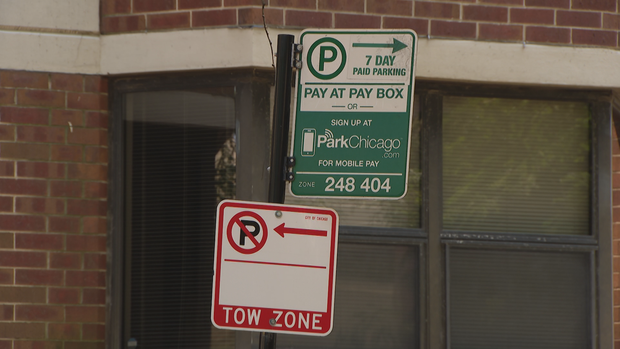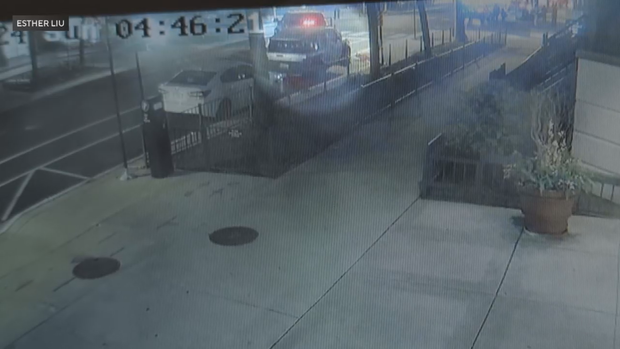Driver faces steep repair bill after finding perfect Chicago parking spot
CHICAGO (CBS) – Esther Liu, a doctorate student from Minnesota, eagerly arrived in Chicago for a research fellowship at the Newberry Library.
She was supposed to be studying the history of Indigenous people as part of the month-long project.
"We get the support of mentors and archivists and access to special collections," Liu said.
Instead of digging into Native American history, she spent most of that month battling Chicago bureaucracy. The battle began with finding the perfect parking spot on the Near North Side.
"I thought I won the lottery getting parking in Chicago on a Saturday night," Liu said.
Finding the perfect parking spot
Liu arrived in Chicago on the 4th of July weekend. Unsure of how paid street parking works, she and a friend spent 15 minutes making sure that lucky parking spot was the real deal.
"We read all the fine print in the box. We called the phone number that's listed on the Park Chicago meter, and someone there said, 'Yeah you're good until the meter resumes at 8 a.m.,' Liu said. "We went into nearby buildings to ask the doormen about the parking spots."
Liu paid for parking until the time the metered spot became free for the rest of the overnight hours.
"I set an alarm to get up early to either move the car or feed the meter," she said.
When she arrived back at the lucky spot around 7 a.m., she couldn't find her 2003 Honda Element.
"My first thougt was I forgot where I parked," Liu said.
That wasn't it. Liu checked the parking meter receipt, and discovered she was at the right spot.
"My next thought was the car got stolen," she said.
Liu was confused, but she didn't panic yet. She checked Chicago websites that are available to try to locate her car.
"The police one didn't turn up anything," she said. "I called 311 for help."
Eventually, she discovered the car had been towed and impounded at the city's tow lot at 701 N. Sacramento Blvd.
Battling Chicago bureaucracy
Finding the car was step one. Getting it back was another ordeal.
"I have had to spend so many hours just figuring out the bureaucratic sprawl," Liu said.
She said city office and help line hours were not conducive with her work on the fellowship. The endless merry-go-round and wait times she got when she was finally able to speak with someone were a constant distraction.
"I've spent so many hours at the auto pound," Liu said.
The tow lot her car was taken to was four miles from where Liu parked it. There's a much closer lot on Lower Wacker Drive downtown. She wonders why her car was taken so far away.
"It was not easy to get there without a car," Liu said of the Sacramento Boulevard lot.
Liu drove head on into another obstacle when she tried to get her glasses and vital medicine out of the car. The problem was that the Honda is registered to her brother, who lives out of state. The impound lot needed his notarized permission to let her take her things out of it.
"They said, 'You can't access the vehicle,'" Liu said. "That was wild. These are essential medications."
Days later with the proper approval in hand, she was allowed a 30-minute pass to retrieve her things.
But the biggest battle of all was over why, when and how the Element was towed.
A doorman at a nearby building showed her surveillance video of a red tow truck hooking up her car – the timestamp shows 4:46 a.m.
But the tow order Liu saw at the tow yard indicates a different time.
"It says that the date and time of the violation was 4:50 a.m.," she said.
Liu questioned the time disparity at the yard and was told maybe the ticket writer's watch was fast. But she has another theory.
"I think this tow order was written after that red tow truck had already snatched my car," Liu said.
Even more confusing was the reason noted for the tow.
"It says I parked in a tow zone," she said.
A Chicago Police officer hand-wrote the tow zone violation ticket and tow order.
Data CBS News Chicago obtained from a public records request showed that officer wrote 32 tickets between midnight and 4:50 a.m. — the time of Liu's ticket.
The data also reveal other questionable timings including two tickets written at 1:30 a.m. and 1:32 a.m. three blocks apart in River North.
In addition, two other tickets written on the Near North Side a block apart, but at the exact same time. 3:35 a.m.
Not the end of the story
To get the tow fees tossed, Liu had to go before an administrative hearing judge twice to prove her case.
Liu is continuing to contest the ticket, which was not on the windshield of her vehicle in the tow lot. It turned up days later, a delay caused by the out of state registration.
But a more costly case Liu continues to pursue is related to the way her Honda was towed.
"You can't tow an all-wheel drive like that," she said.
The building surveillance video clearly shows a tow truck quickly hitching up her car and dragging it off on its back two wheels. All-wheel drive vehicles should be put on flatbeds.
The officer who wrote the ticket and tow order indicated the vehicle was front wheel drive. A simple VIN check would have revealed otherwise.
Now, Liu is back home in Minnesota and her car remains in Chicago.
"All I know is I had a good, working, recently serviced car," Liu said. "I parked it in Chicago, and now I have a nearly totaled car."
Repairs to just get the car running again could cost Liu thousands of dollars.
She has filled out what United Road Towing calls "Discrepancy Forms" to recoup the cost of the damage. United Road Towing has a newly inflated $96 million contract with the city to tow vehicles and maintain city impound lots and handles damage claims.
The city website indicates the claims process may take "several months before a final determination is made."
"I think it just really impacts the public perception and image people have of the City of Chicago," said Liu.
Down the road
Ald. Gilbert Villegas (36th), wants to improve Chicago's image and help consumers like Liu when it comes to dealing with tow companies.
"This ordinance takes a look at when a tow truck driver does have a vehicle, what are some of the responsibilities?" said Villegas.
He plans to bring his new proposal before City Council soon.
"There's a lot more teeth we're getting in there to make sure consumers are not being taken advantage of," Villegas said.
We provided some of the surveillance video to Chicago Police and the Department of Streets and Sanitation. Neither would comment specifically on the video or even tell us which company the red tow truck belongs to.
CPD indicated Liu's ticket is under investigation. Streets and San noted that when a police officer writes a ticket and tow order, the tow truck driver has no discretion to ignore such orders even if it's wrongly issued, like in Liu's case.
Another issue is with the way the tickets are written – by hand. Neither CPD nor Streets and San could explain the time discrepancy between the video showing the tow happening before the violation time noted on the ticket. E-citations could clear up some of the confusion surrounding violation times, illegible handwriting and may lead to better record keeping.
CPD could only provide one day's worth of tickets issued by the officer who wrote Liu's ticket because any more would be too burdensome since they're all written by hand. CPD also acknowledged it does not track ticket-writing by specific officers.
Streets and San indicated in a previous story about a wrong tow years ago that it was going to initiate electronic citations – but now indicates that hasn't happened yet.







